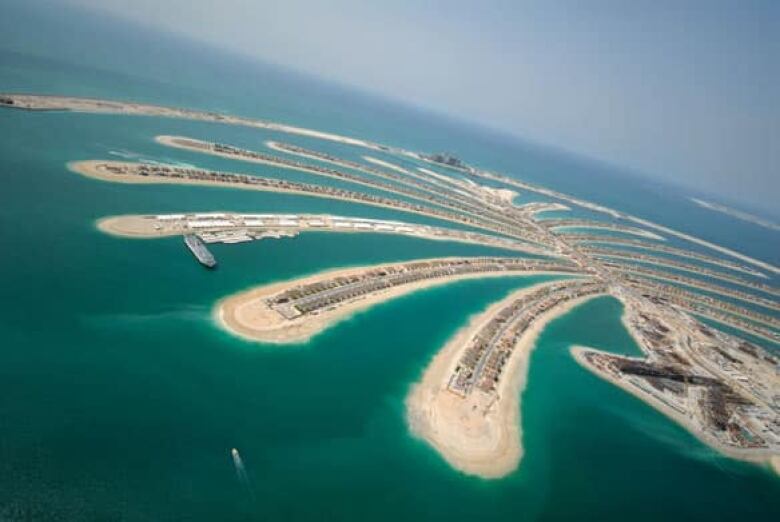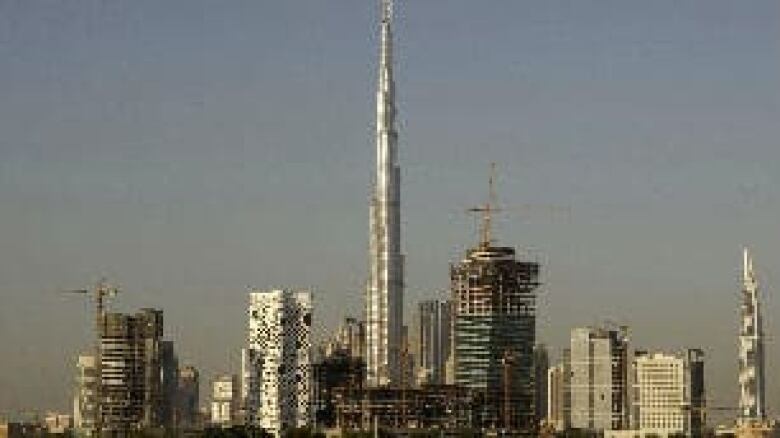Debt crisis puts spotlight on Dubai World
State-owned firm has interests around the world, including Canada

For more than a decade, Dubai's ruling family has been trying to transform the Persian Gulf emirate into an ultra-luxurious tourist destination for the very well-heeled.

The sail-shaped Burj al Arab hotel the only (self-proclaimed) seven-star hotel in the world proudly affirmed its status as the most expensive placeon the planetto spend a night with rooms starting at more than $1,000 US. It was just one of many structures in the Gulf emirate designed to impress or outrage, depending on one's point of view. The world's rich and famous, it seemed, couldn't get enough of such ostentatious displays.
Amid such a building frenzy, real estate prices predictably spiralled out of control. And just as predictably, they plunged earthward in 2008 and 2009 when the property bubble burst as the global financial crisis abruptly put an end to the migration of money. Hundreds of billions of dollars worth of building projects were delayed or cancelled. Thousands of jobs disappeared.
Dubai, playground of the ber-extravagant, suddenly found itself facing the very real possibility that its biggest state-owned company, Dubai World, could go into bankruptcy. It warned it was having trouble making debt payments on $59 billion US money borrowed to pay for all the excess.
Dubai World is Dubai's mainholding and investment enterprise, but its holdings range far beyond the Persian Gulf area. It has a hand in developments around the world, Canada included.
Minority stake in Cirque du Soleil
In 2008, two companies controlled by Dubai World Nakheel Properties and Istithmar World Capital bought a 20 per cent interest in the Cirque du Soleil, the world-renowned performing arts company founded by Montreal's Guy Lalibert.
The minority stake resulted from a 15-year partnership struck in 2007 to develop a new Cirque du Soleil show that would open in 2011 in a new theatre to be built in Palm Jumeirah, one of several palm-shaped islands off the coast of Dubai being developed by Nakheel Properties.
Another Dubai World holding DP World operates Centerm, a container terminal in Vancouver's inner harbour. DP World acquired the terminal when it bought the marine terminal assets of P&O Ports in 2006, and plans to spend $140 million to expand it.
That purchase also gave it ownership of many key U.S. ports something that raised national security concerns in the U.S. Some American legislators didn't like the idea that U.S. ports would be controlled by Middle Eastern state-owned enterprises. DP World subsequently sold its U.S. port assets.
In Britain, another Dubai World subsidiary, Leisurecorp,bought the Turnberry Resort in Scotland in 2008 home to the 2009 British Open for more than 50 million pounds.
In the U.S., Dubai World's investment arm, Istithmar World, bought the luxury retailer Barneys New York in 2007 for almost $1 billion US. There were reports earlier this year it was trying to unload the retailer as the luxury market unwound and Istithmar racked up big losses from the global financial meltdown, but Dubai World's chair denied it.
Controversial developments
There's no question that Dubai World's best-known holdings are its ultra-lavish tourist resorts and residential developments. Its Nakheel real estate division is building thousands of luxury homes, retail stores and luxury hotels onthe artificial palm-shaped islands. Construction began in 2001 and is scheduled to run through 2015.
Nakkheel says it will ultimately add more than 600 kilometres of beachfront to the Dubai coastline as part of a huge land reclamation project that will see millions of tonnes of sand and rock dumped into the Gulf to secure the necessary foundation.
The scale of that development plan has frequently been criticized, and not just for reasons of taste. Dubai's massive construction boom attracted much criticism from human rights groups. Tens of thousands of workers were brought in from the developing world, especially India, to do the heavy lifting. There have been many reports of ill treatment, low wages and substandard housing.
Despite the controversy, fiscal and otherwise, Dubai World and its emirati masters seem determined to carry on. But talk of the possibility of asset sales is already appearing in the financial press. There is speculation, too, that another of the emirates oil-rich Abu Dhabi might have to step in to help. Earlier this year, the Abu Dhabi-based central bank snapped up half of Dubai's $20-billion US bond offering.
"The Sun Never Sets on Dubai World," trumpets the banner on the company's website. These days, that's a boast that seems increasingly difficultto sustain.












_(720p).jpg)


 OFFICIAL HD MUSIC VIDEO.jpg)
.jpg)



























































































